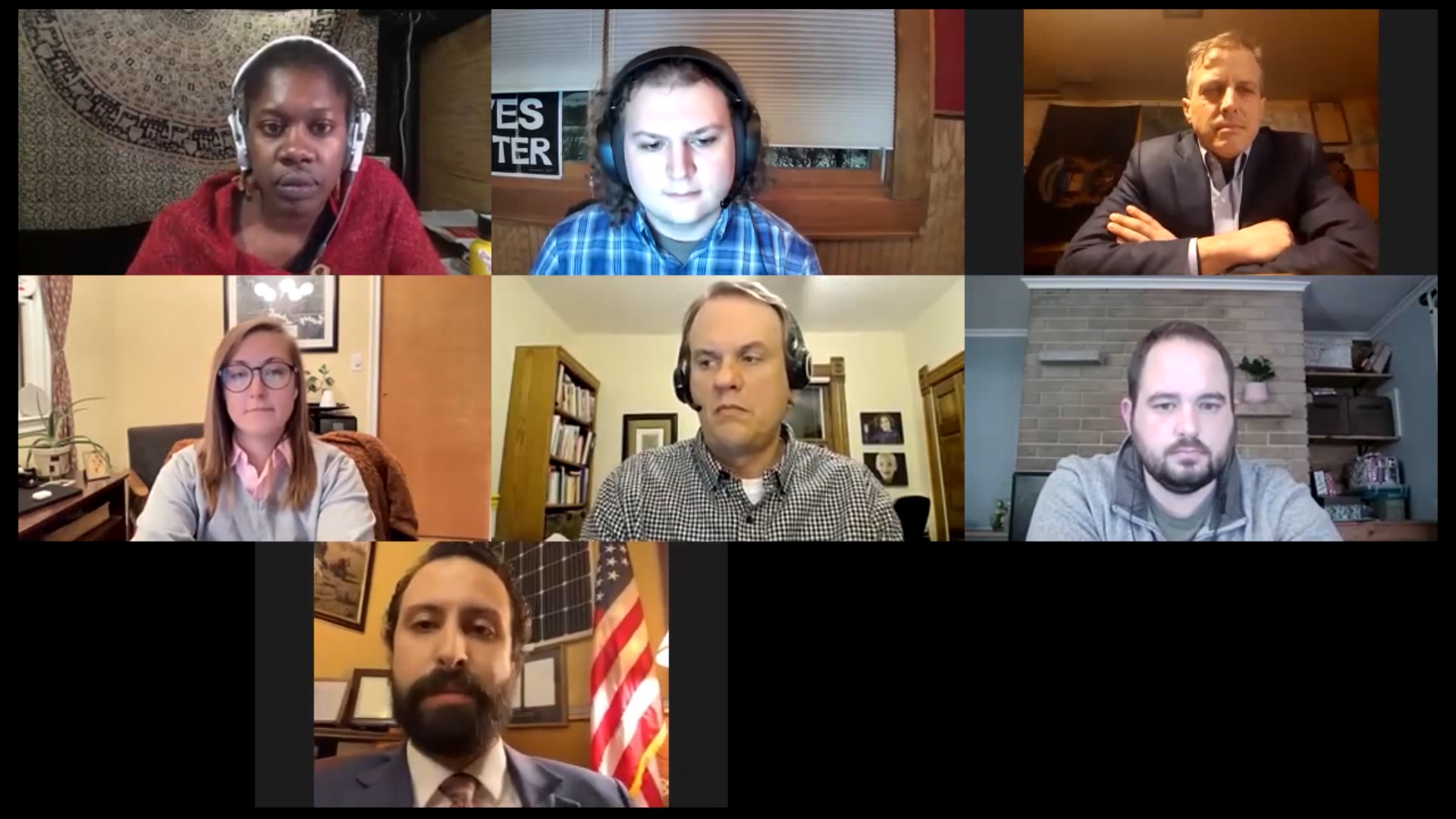“Cheaper, Cleaner, more Reliable”: Panelists Discuss Push to Replace DTE
by Chris Lewis
A recording of the roundtable discussion may be viewed here.
Six local leaders and experts in sustainability and energy met to discuss the potential for public power in Ann Arbor. The event was the first of an ongoing series of round tables hosted by the organization Ann Arbor for Public Power.
The fundamental question of the night was whether Ann Arbor should replace DTE with a public energy utility. “Yes. Is that good? Should I go on mute now? [20:00]” joked Desirae Simmons, Co-Director of the Interfaith Council for Peace and Justice.
“When we look at communities that have public power, power systems that are accountable to their voters and their people, they get power that is cheaper, that is cleaner, and that is more reliable [28:00],” added State Senator Jeff Irwin.
The panelists were asked what issues we’re facing with DTE and why Ann Arbor would want to create a municipal utility. “DTE is currently the third dirtiest major utility in the country,” said Liz Ratzloff, [13:40] Co-Chair of the Huron Valley Area Labor Federation Climate Council. “[DTE] plans to keep coal online for too long and ignores the carbon emissions caused by burning natural gas… People living in low income communities and communities of color bear the brunt of the current plan both with high energy bills and with exposure to pollution.”
Ratzloff also spoke to reliability concerns. “Michigan has among the country’s least reliable electric grids in terms of frequency and length of outages,” she said. Ratzloff attributes these outages to DTE’s “‘replace it when it breaks’ approach to upgrading infrastructure.”
Chris Bzdok, an energy and environmental lawyer and former mayor of Traverse City, argued that municipal utilities are cheaper, more reliable, greener, and provide pride of ownership.
“I’ve been on Traverse City Light & Power for 24 years. I’ve experienced one outage longer than eight hours in 24 years,” he said [33:10].
State Representative Yousef Rabhi described how Michigan’s utilities evade accountability for outages and pollution. “The fundamental problem that exists with DTE (and Consumers) today is that we say these are regulated utilities but that is the greatest misnomer that could be,” he said [15:50].
“When you see the power and influence that they have over legislators and over what legislation gets to move and what legislation doesn’t I can tell you from firsthand personal experience they are the regulators.”
Rep. Rabhi described how a muni could offer cost savings to Ann Arbor. “You have to remember that DTE and Consumers have basically a guaranteed 10 percent profit margin,” Representative Rabhi pointed out, claiming that the lack of profit margin is “a cost efficiency that municipal utilities have.”
Sean McBrearty, Michigan Legislative Director for Clean Water Action, described how Lansing’s municipal utility responded to a winter storm in 2013-14. “That winter there was a big ice storm that knocked out power for over 40k Lansing households,” he said.
Afterward, he said, Lansing residents were able to exert influence over the utility and hold it accountable. “There was a huge public process in Lansing to hold the [Board of Water and Light] accountable and they wound up doing a big year-long review process with a public commission appointed to review their protocols,” he said. “They made over a hundred distinct protocol changes, and we haven’t had any issues like that since.”
Community members in attendance asked panelists about who would staff a municipal utility if Ann Arbor created one.
“A sustainable energy transition has to be a just transition for workers and communities,” Ratzloff said. “Locally, the International Brotherhood of Electrical Workers (IBEW) Local 17, represents 3600 members who are linemen and women, tree trimmers, et cetera, and many of them work for DTE, either as employees or contractors. So, we have to make sure that whatever plan we have includes good jobs for those workers and the workers that we’ll need to move to a sustainable energy plan.”
Other speakers discussed how Ann Arbor municipalizing could have effects on other communities DTE serves. “One of the things I think about for a smaller community like Ypsi, I wonder about how it could help us to do something similar,” Desirae Simmons said [43:50].
The city of Ann Arbor recently approved a resolution to explore multiple potential pathways to reach its 2030 100% renewable energy goals. The resolution called on the city to commission a feasibility study into full municipalization in addition to beginning work on a sustainable energy utility.
While some see these two plans as alternatives to one another, Senator Jeff Irwin disagreed. “I see the SEU as a bridge to full municipalization, he said [1:07:00]. “It’s a way of working towards that goal more quickly by implementing meaningful steps that get us there.”
Traverse City’s Bzdok described the roadmap to create a municipal electric utility.
First, Ann Arbor would do a feasibility study and calculate the value of DTE’s infrastructure, he said. Then the city would hold an election to decide whether to acquire the assets, and if it passed, the city would then decide to either purchase or condemn DTE’s electric lines, or build new ones. Next, the city would seek regulatory approval.
The utility would make money for the city, Bzdok said. “It’s a solid business. It’s a very stable, very low risk business compared with almost any other, and it’s a long-term business, so it’s financeable,” he said. Then the city would get a franchise, set electric rates, and complete last steps with the Michigan Public Service Commission.
“There is a roadmap,” Bzdok said. “This is in the state constitution. It’s in state statute. It’s not a novel idea. It’s fundamental to the government of the State of Michigan that you can do this.”


Comments are closed, but trackbacks and pingbacks are open.